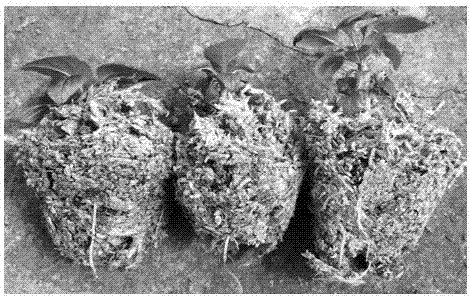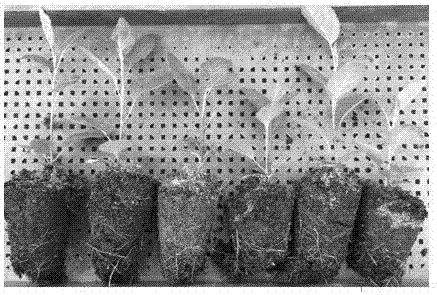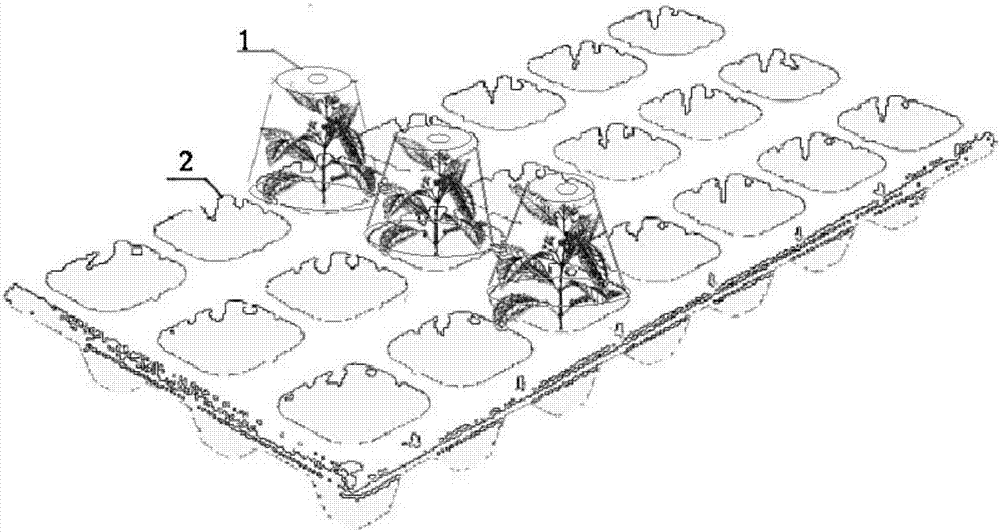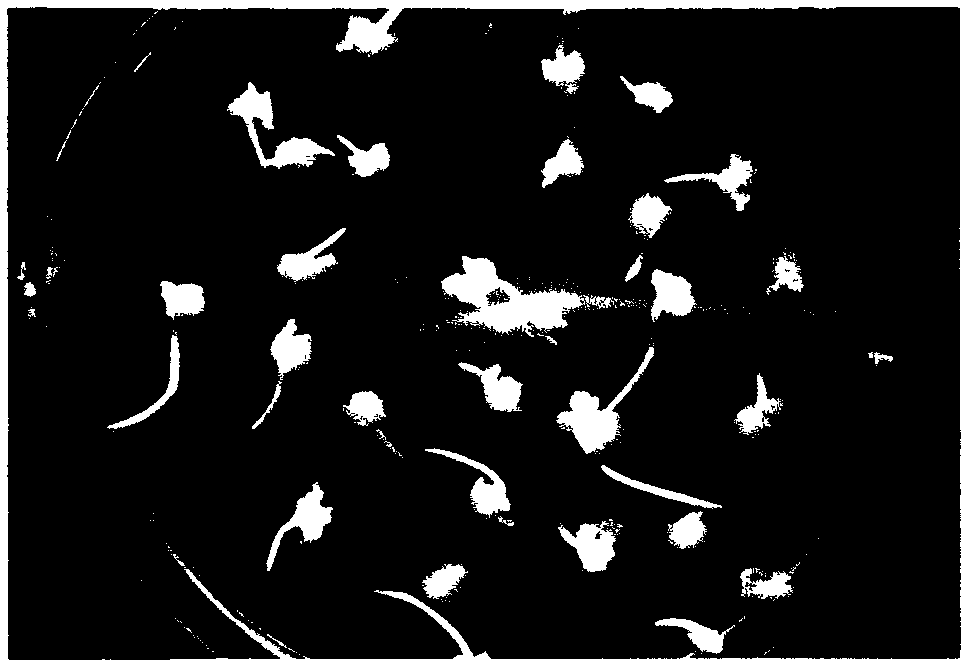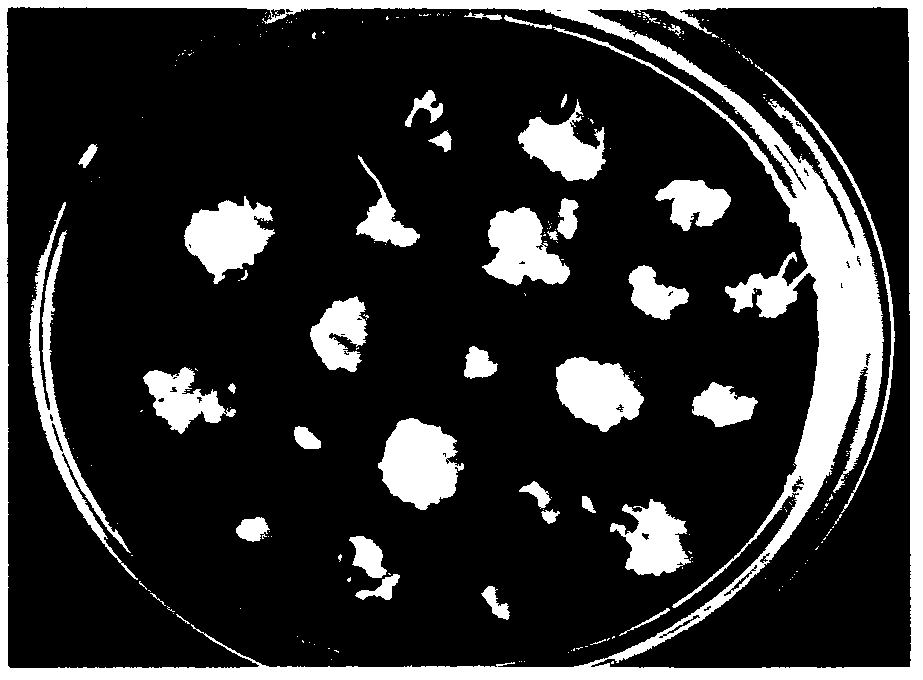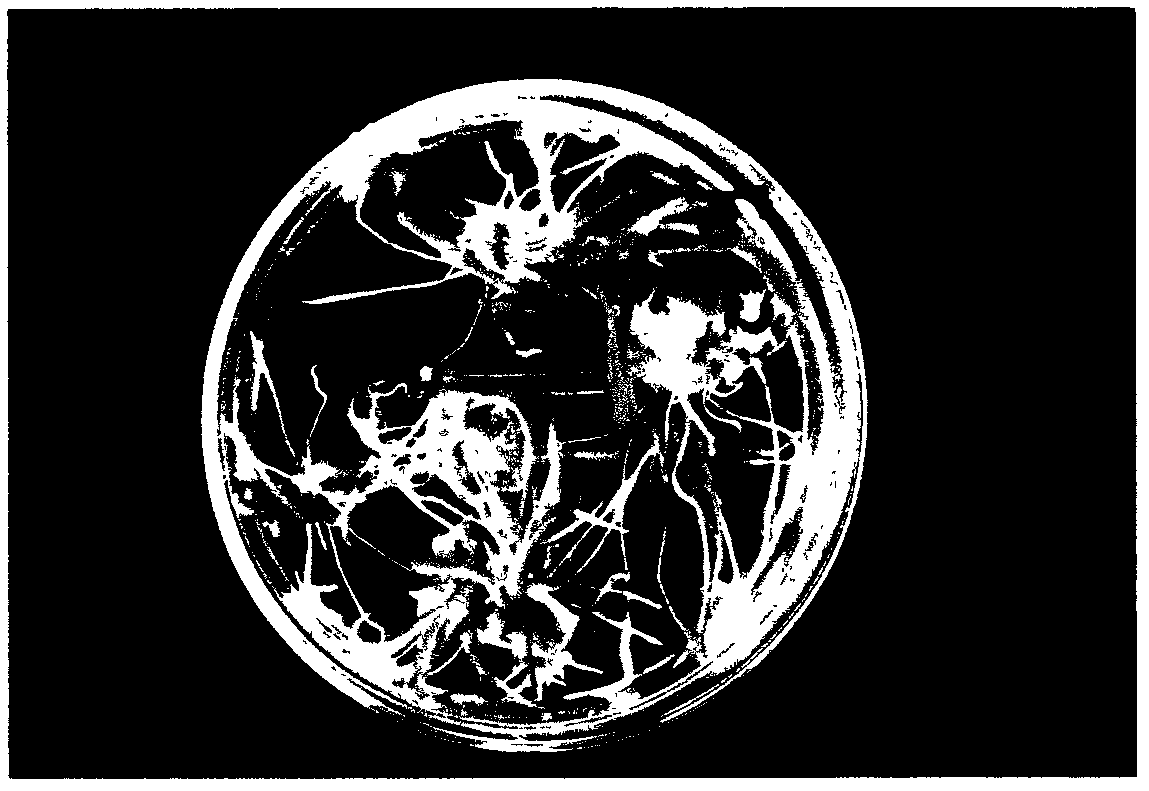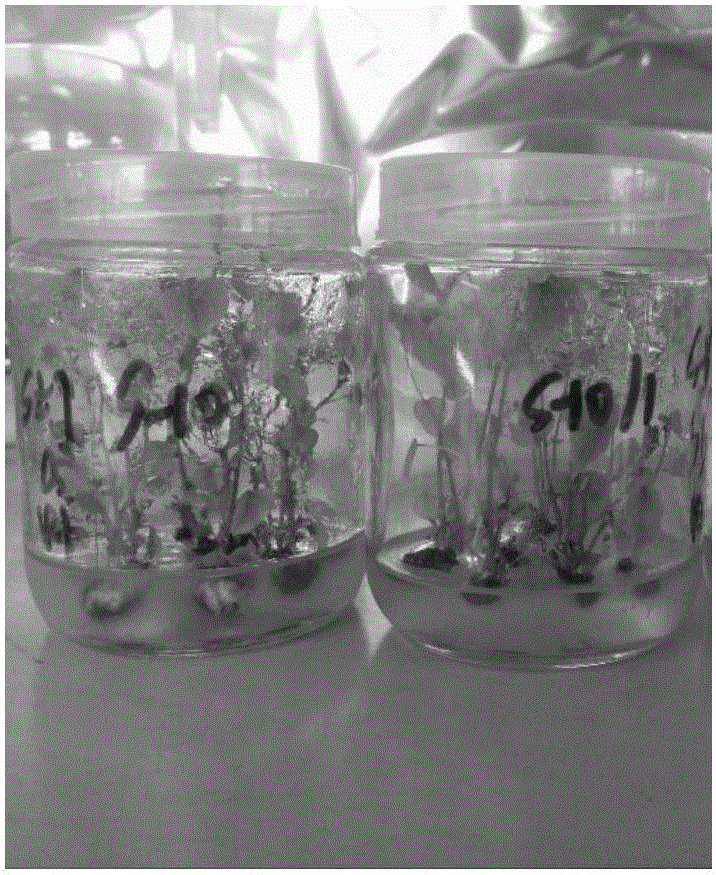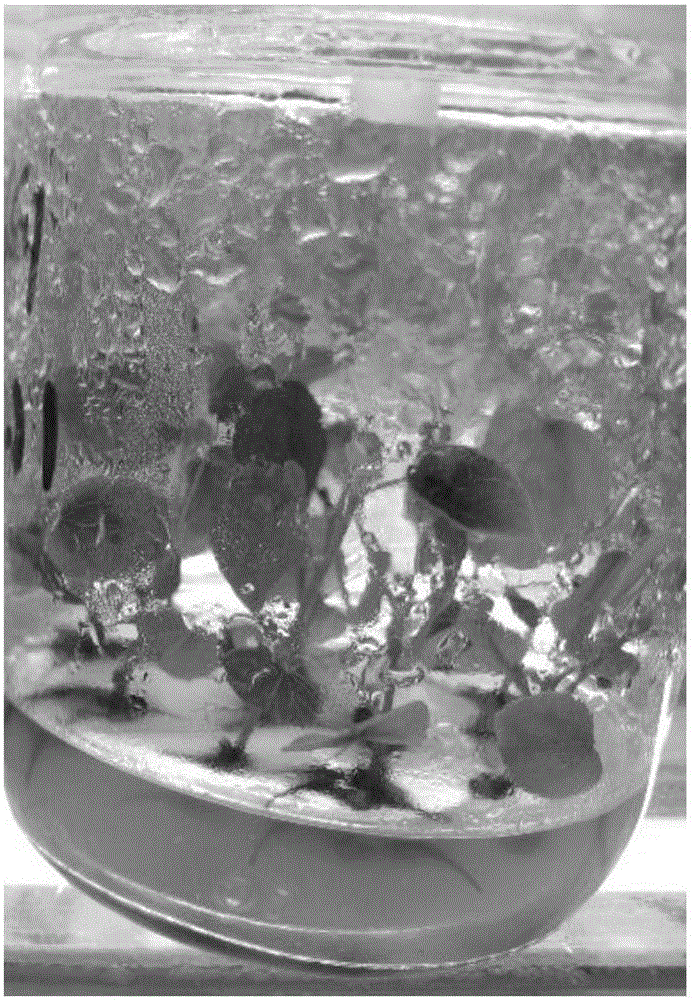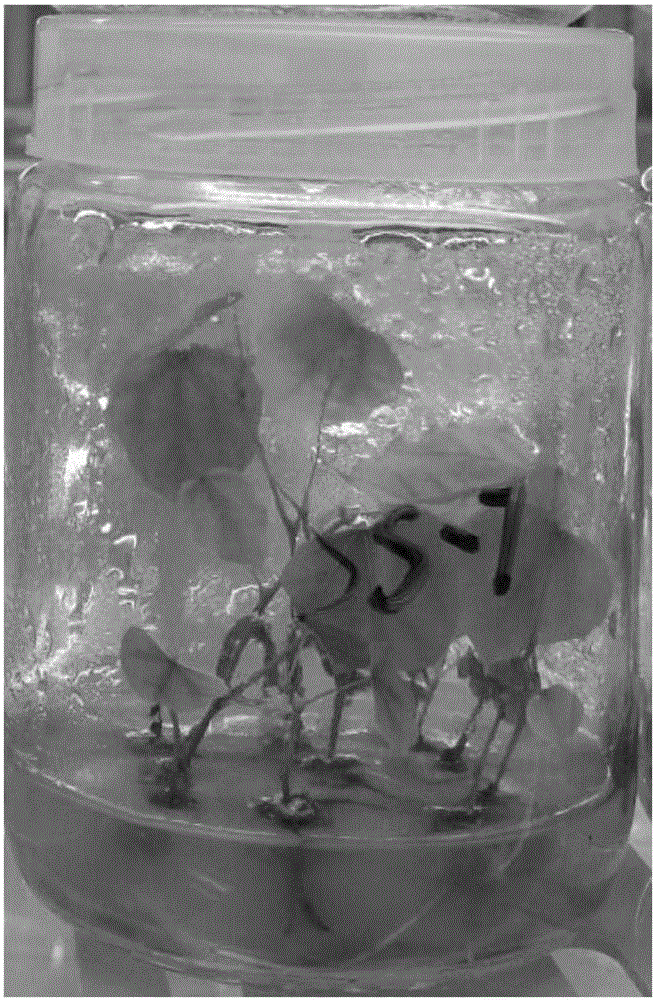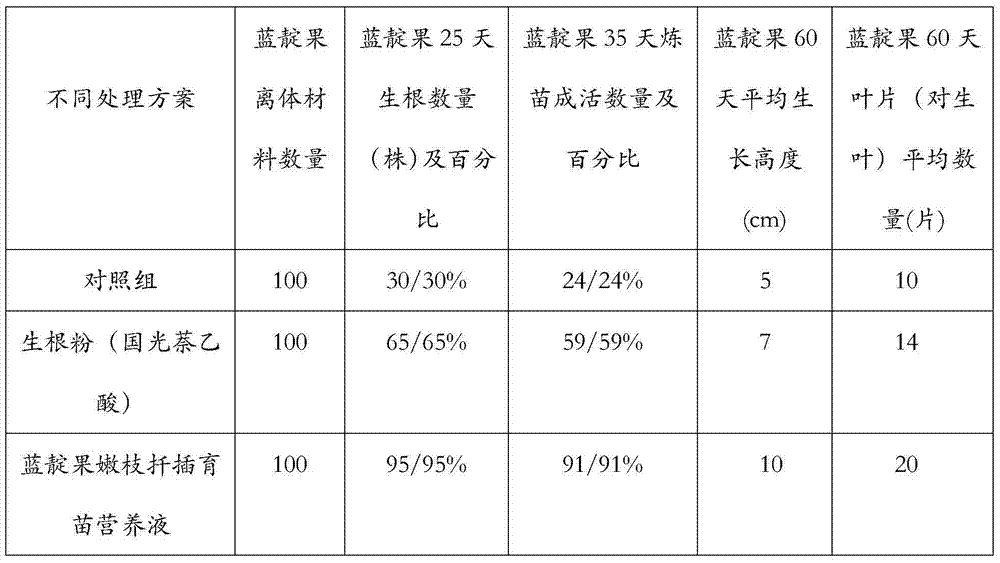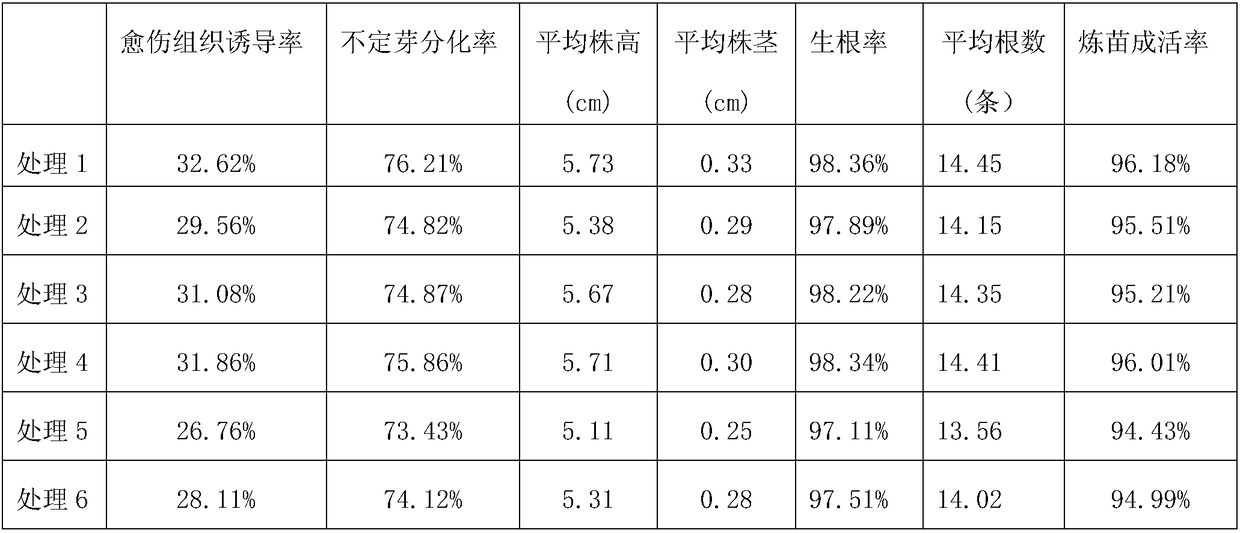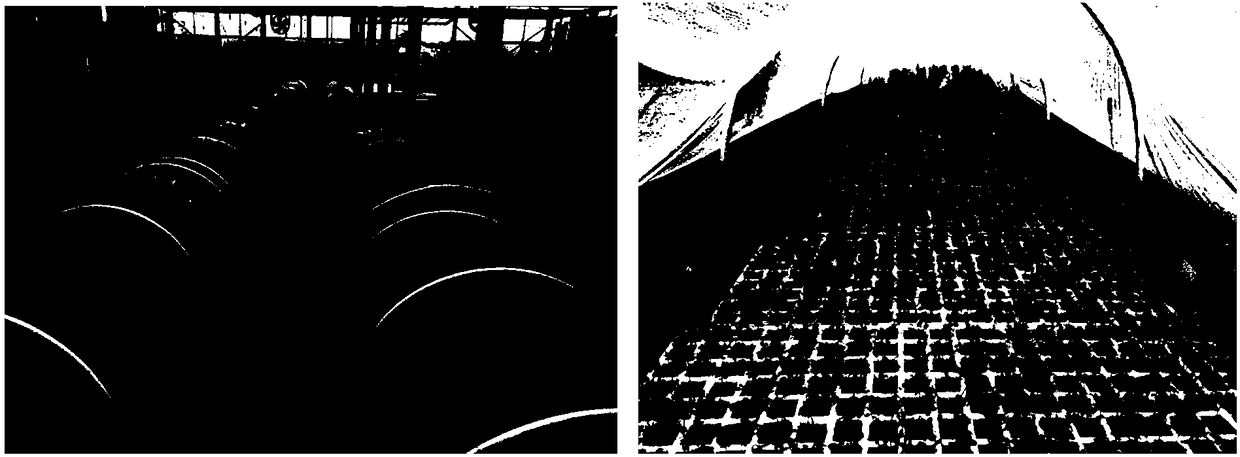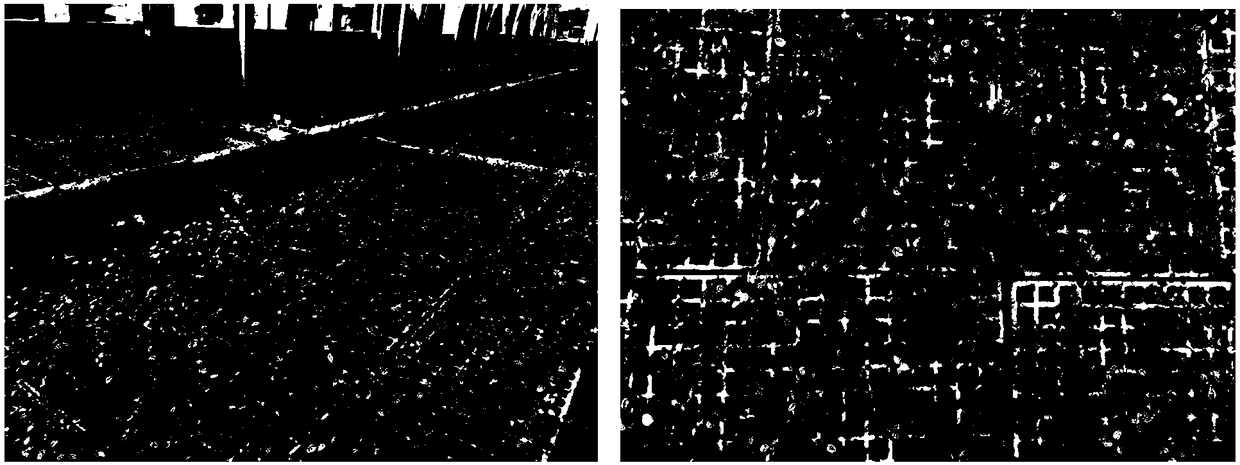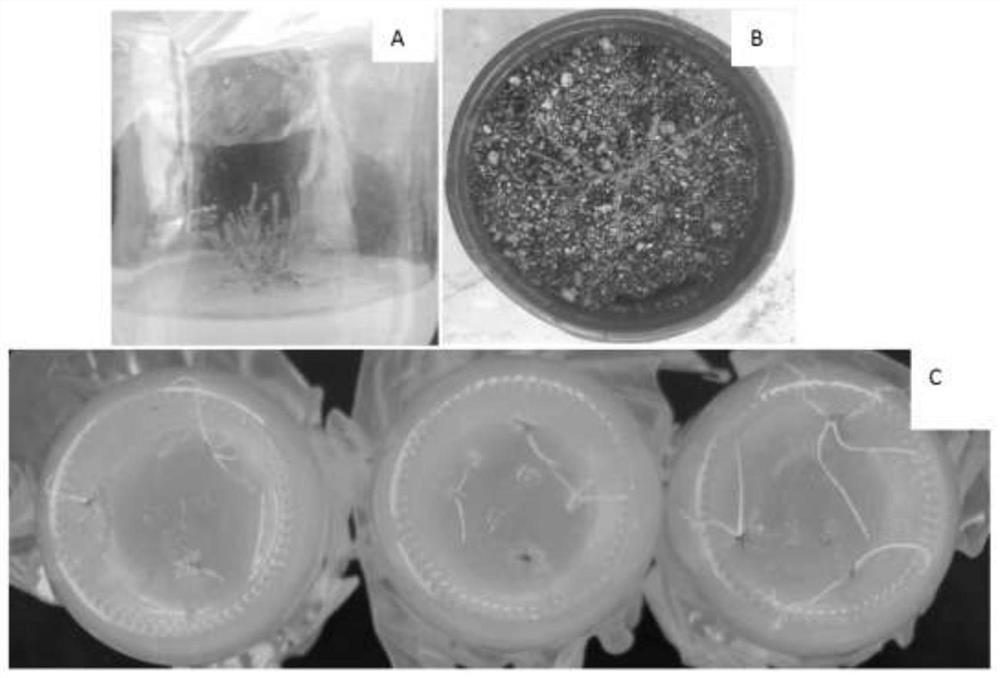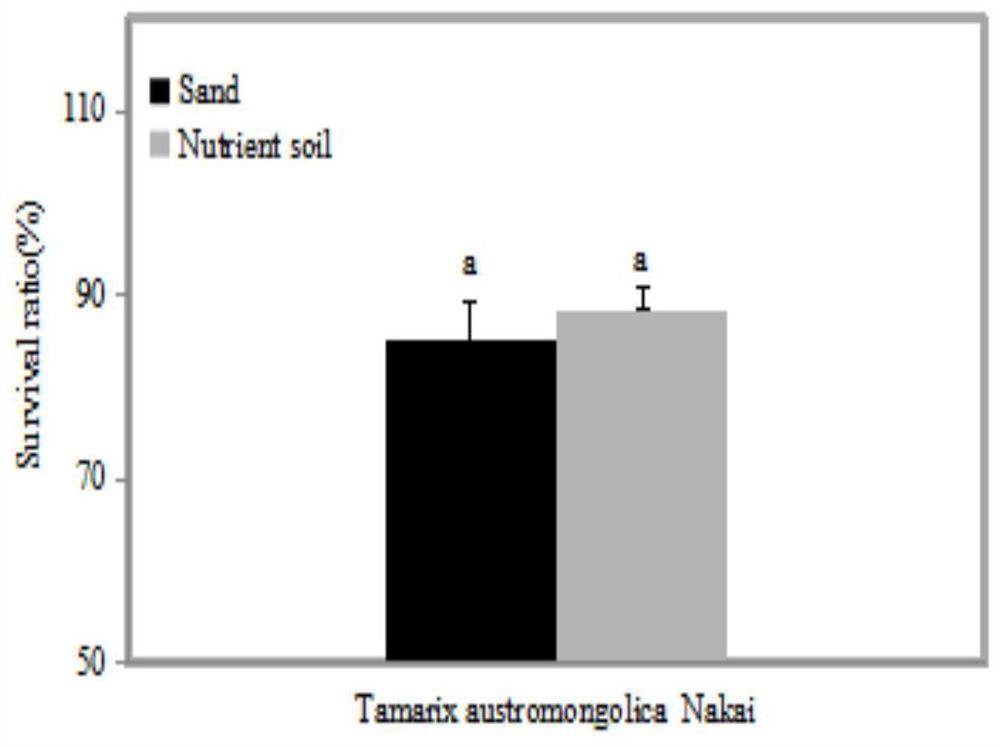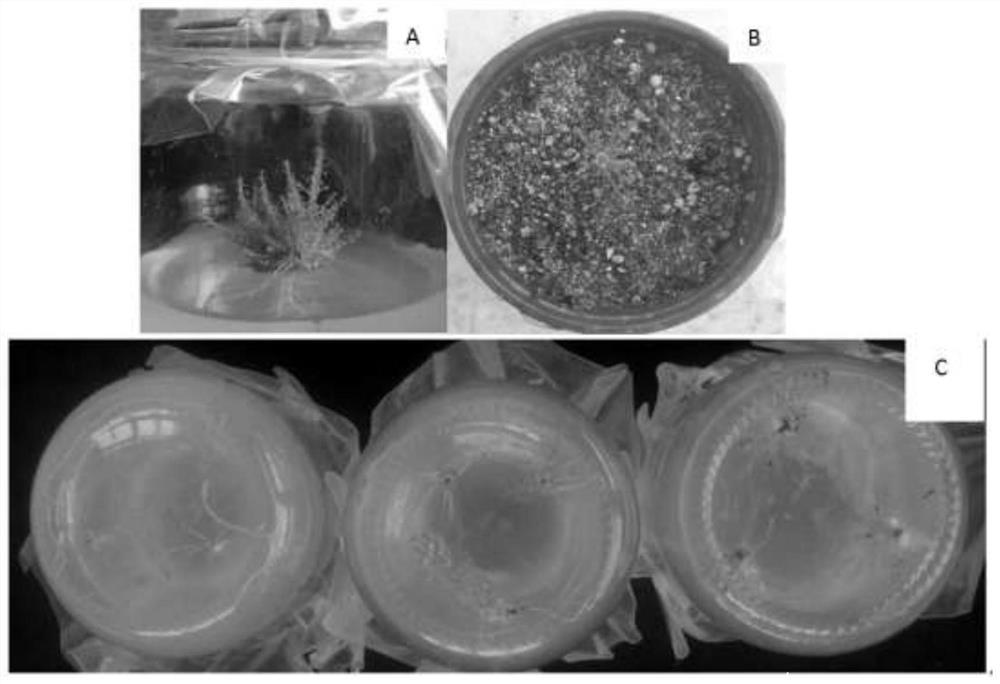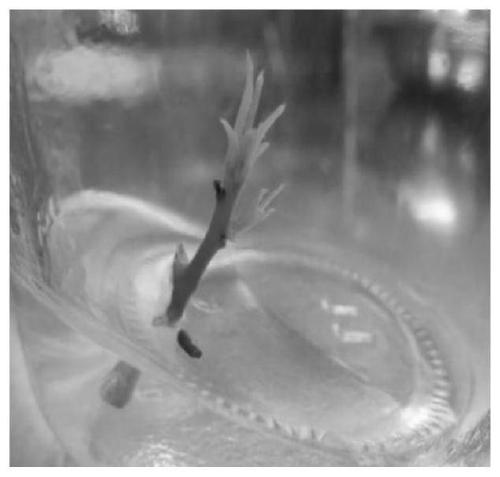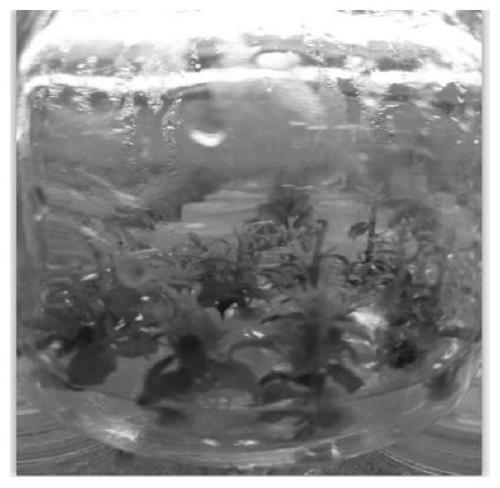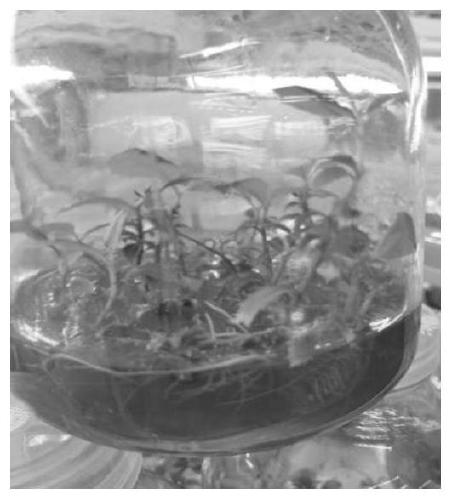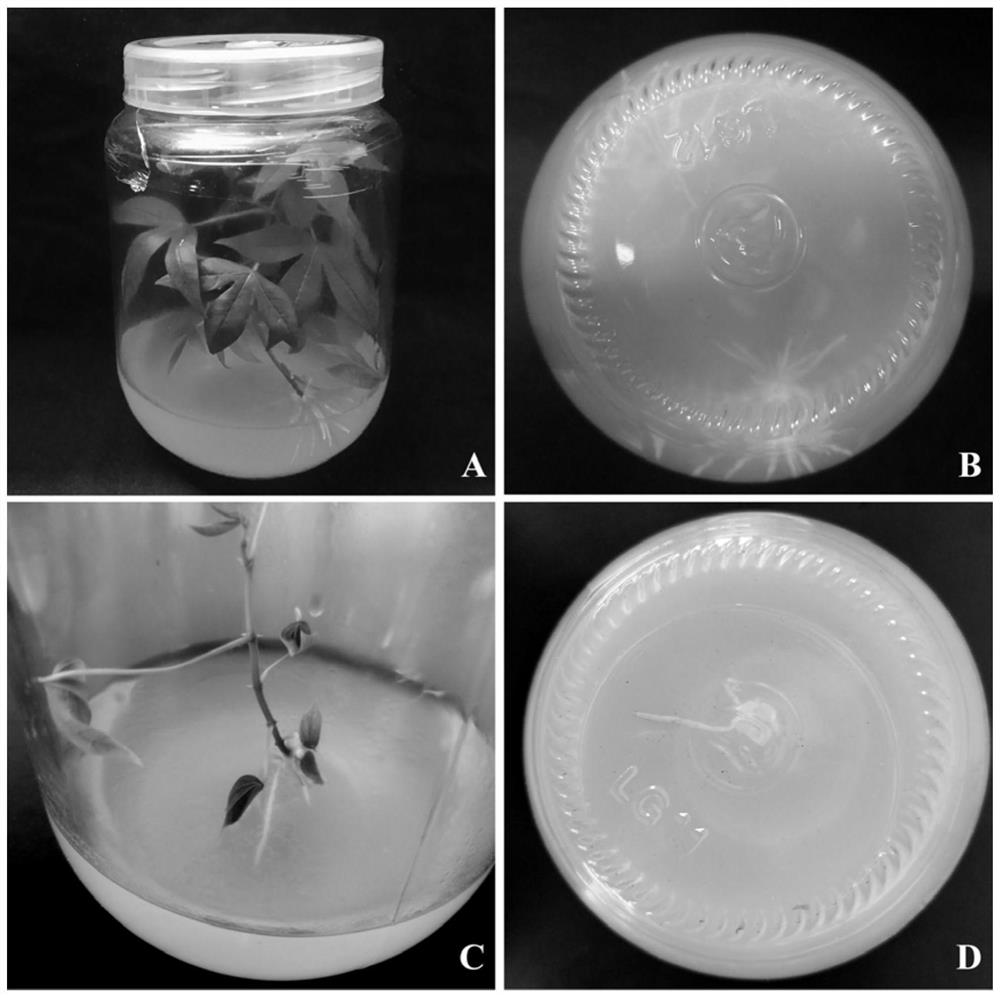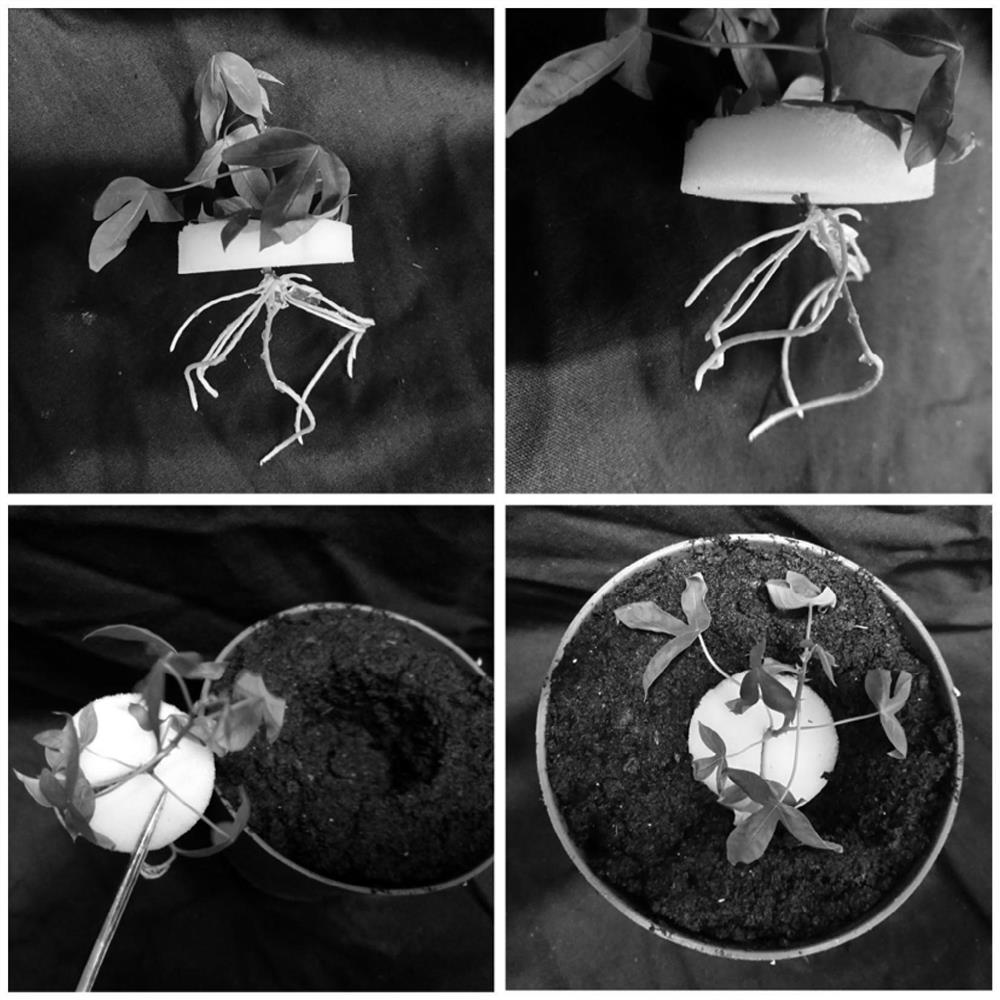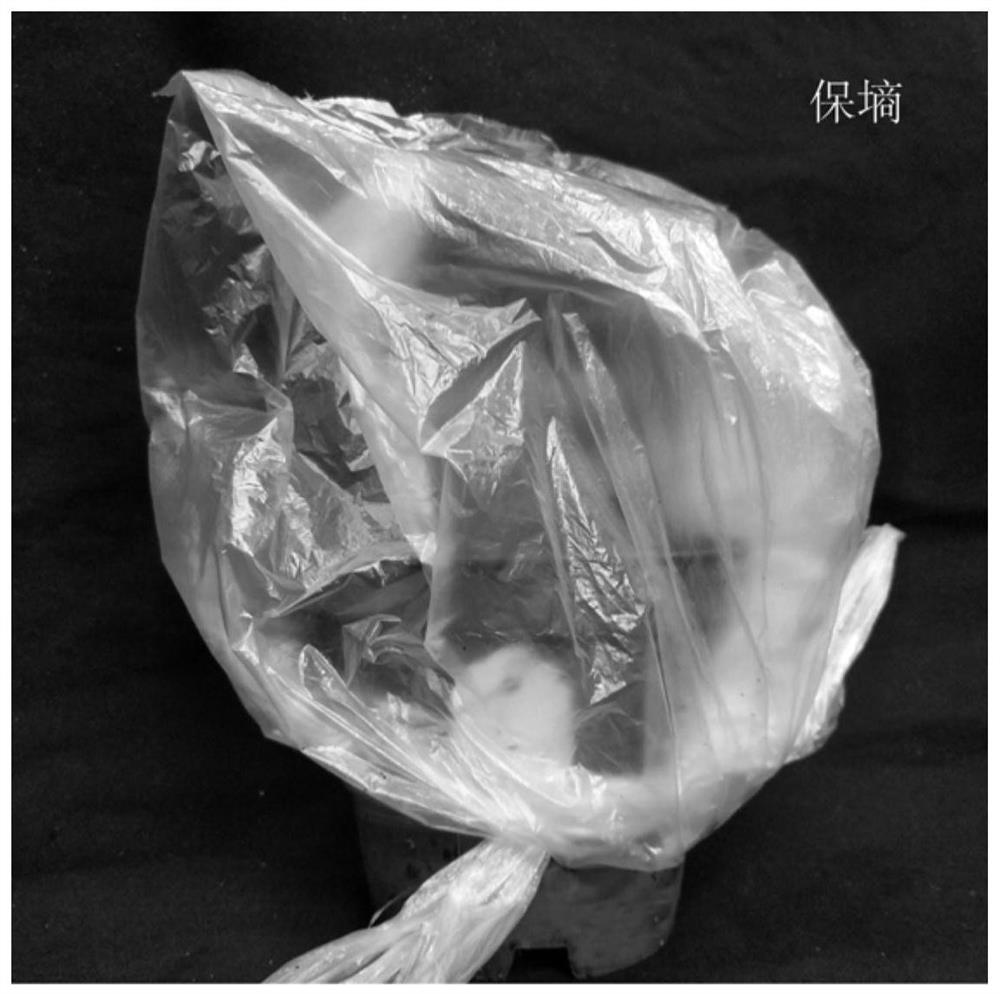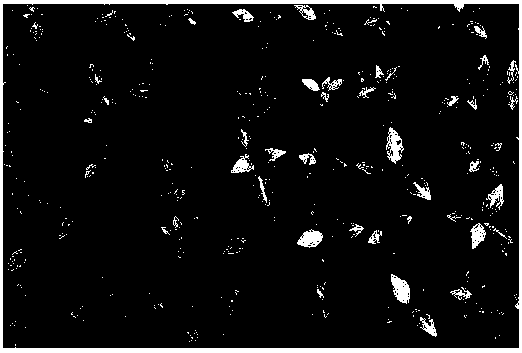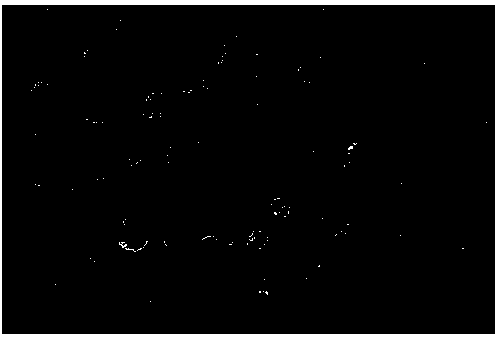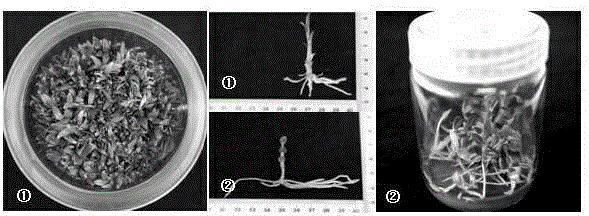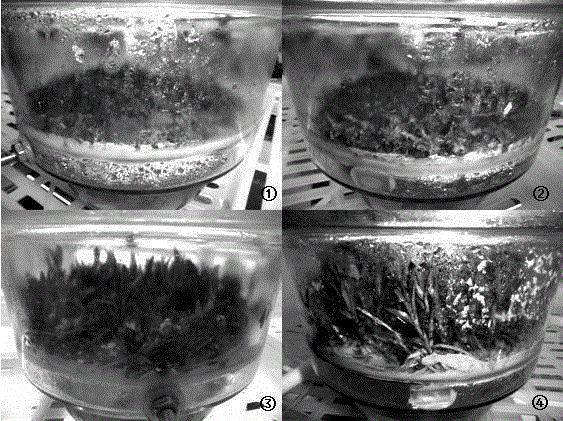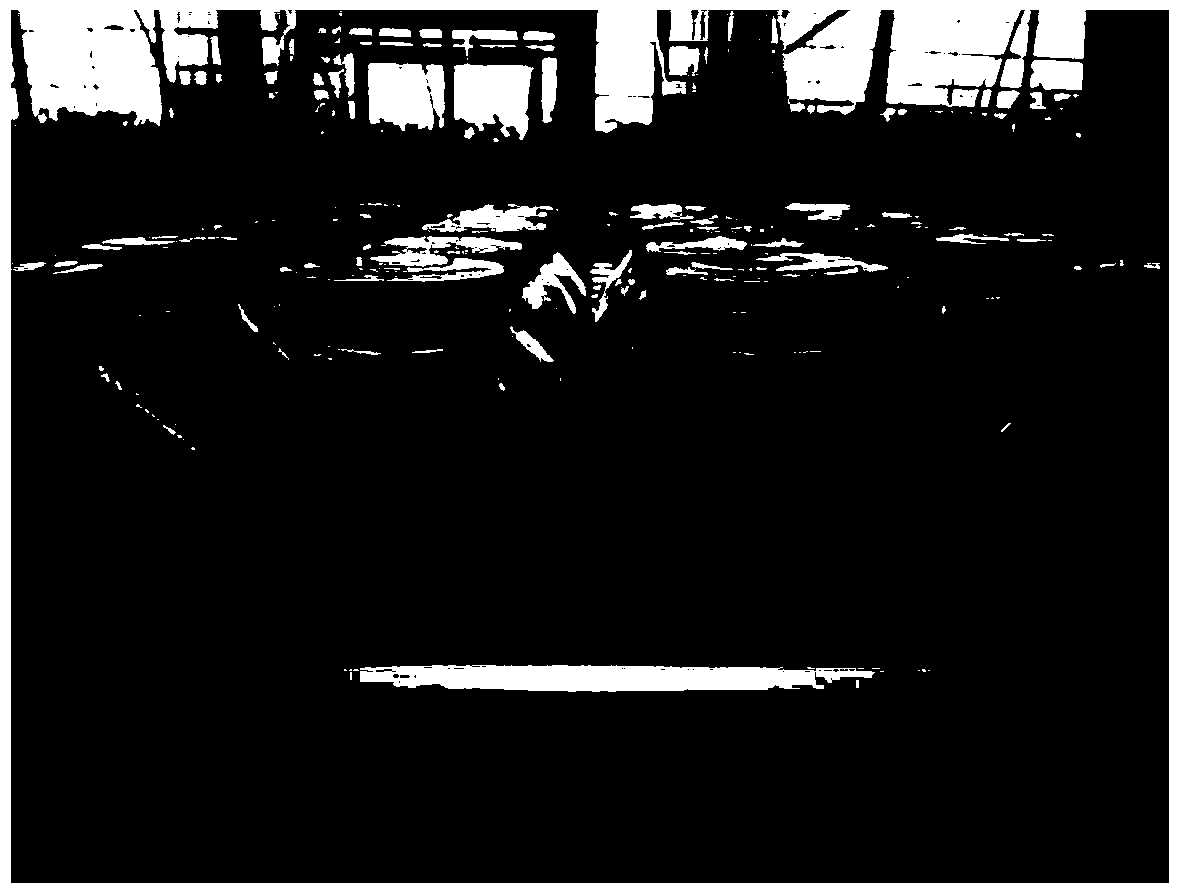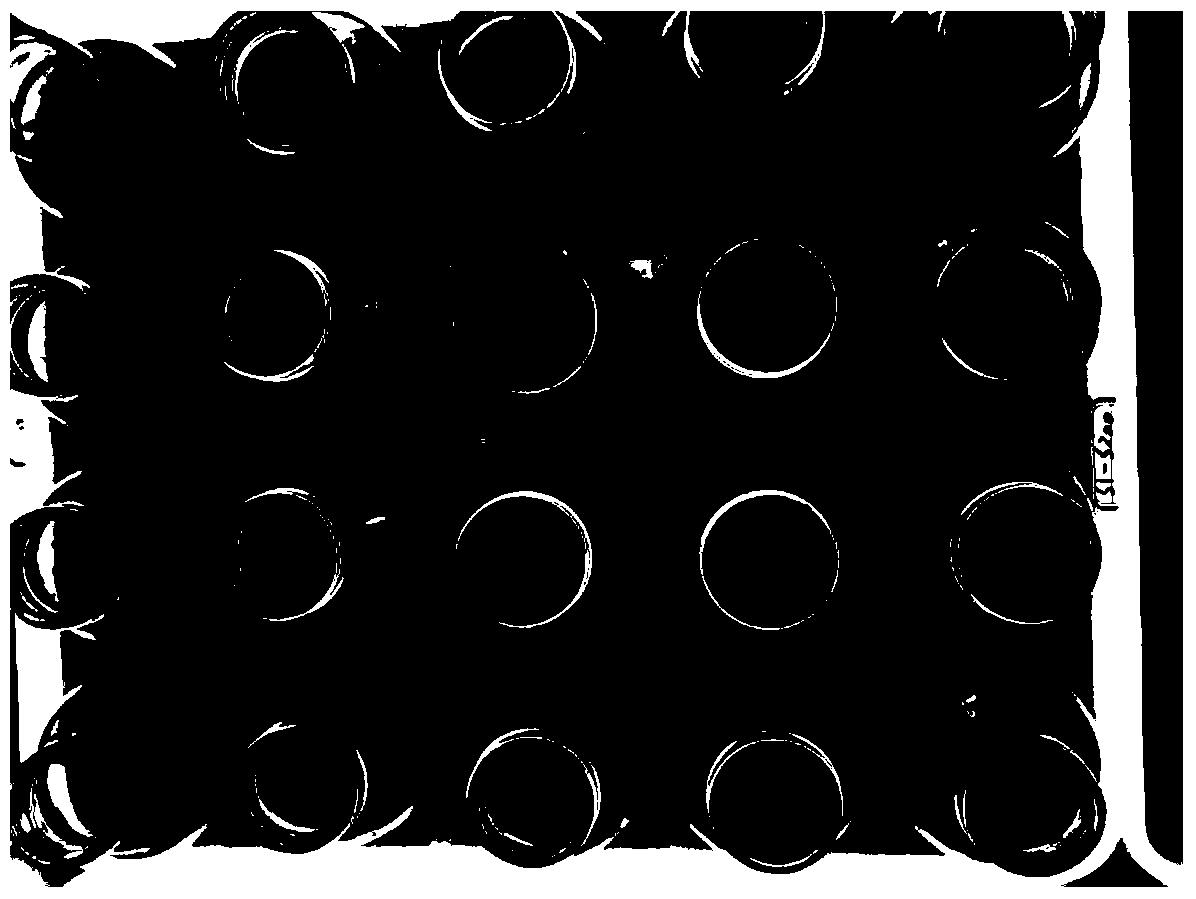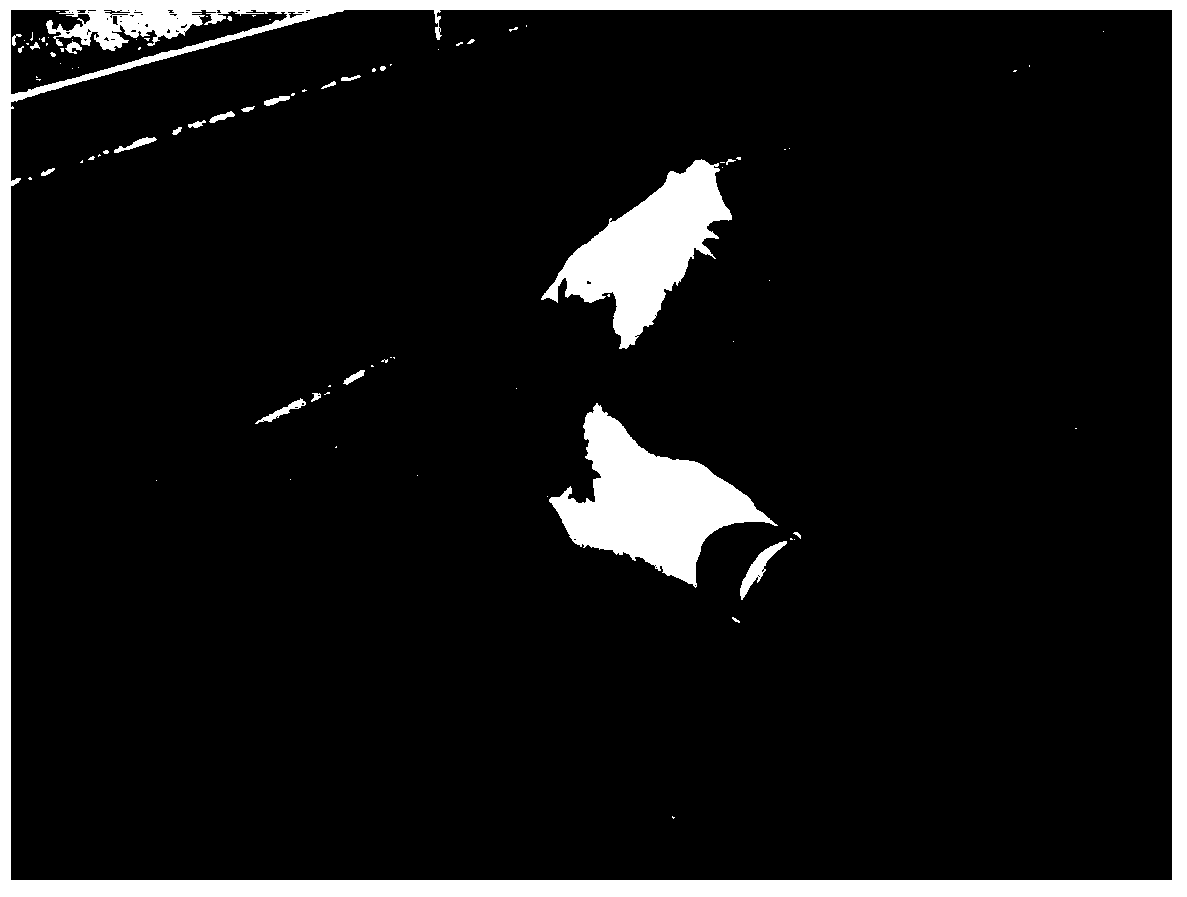Patents
Literature
33results about How to "Improve the survival rate of hardened seedlings" patented technology
Efficacy Topic
Property
Owner
Technical Advancement
Application Domain
Technology Topic
Technology Field Word
Patent Country/Region
Patent Type
Patent Status
Application Year
Inventor
Tissue culture seedling-growing method for bird's-net fern
InactiveCN1868262AEasy to getEasy to obtainHorticulture methodsPlant tissue culturePterisMicrobiology
A tissue culture method for new pteris fern includes such steps as obtain aseptic material, primary culture with the culture medium containing MS, 6-BA, NAA and AC, reproduction culture with the culture medium containing MS, 6-BA and AC, rooting culture with the culture medium containing 1 / 2 MS, NAA and IB, and intelligent culture of seedlings.
Owner:慈溪市蔬菜开发有限公司
Method for domesticating hardening seedlings of tissue culture seedlings of Nandina domestica firepower
InactiveCN102939843APromote growthImprove the survival rate of hardened seedlingsClimate change adaptationGreenhouse cultivationPlantletSeedling
The invention relates to a method for domesticating hardening seedlings of tissue culture seedlings of Nandina domestica firepower. The method is characterized by comprising the following steps of establishing a hardening seedling greenhouse; screening and treating a hardening seedling matrix; managing the tissue culture seedlings before the tissue culture seedlings are bottled out; treating the tissue culture seedlings after the tissue culture seedlings are bottled out; transplanting the hardening seedlings of the tissue culture seedlings; managing the tissue culture seedlings after the hardening seedlings of the tissue culture seedlings are planted; and domesticating the hardening seedlings of the tissue culture seedlings for four months to obtain qualified domestication seedlings of the Nandina domestica firepower. By means of the method for domesticating the hardening seedlings of the tissue culture seedlings of the Nandina domestica firepower, surviving rates of the domestication seedlings are increased form 58% of traditional surviving rates to 83.5% so that the surviving rates of the domestication seedlings of the tissue culture seedlings of the Nandina domestica firepower are greatly increased, the tissue culture seedlings which are obtained by four month domestication of the domestication seedlings can basically adapt to growth environment of the greenhouse, root systems of plants are thick, new twigs are good, stalks are thick, and the surviving rates of the transplanted domestication seedlings can reach 95.8%.
Owner:中林绿苑江苏生态环境有限公司
Open plant tissue culture and factory rapid propagation method
InactiveCN102217543AWide choiceNo lossHorticulture methodsPlant tissue cultureDust controlHigh pressure
An open plant tissue culture and factory rapid propagation method disclosed in the invention, is characterized by: using a transparent container, dispensing the boiled medium containing antibacterial agent Shannon 1 with different concentrations into a culture vessel to prepare a medium, sterilizing the inoculation room with alcohol for dust control and ultraviolet irradiation, cleaning the surface of the inoculation bench and hands with alcohol, opening a bottle cap, inoculating the plant to the medium by using an inoculator, and then sealing. The invention has the beneficial effects that: the culture container has a broad range of choice, a plastic cup, plastic casing with autoclaving resistance can be used as the culture container; the medium has no loss of components without autoclaving, hormone types have a broad range of choice; the inoculation can be directly carried out in an open and bacterial environment without a clean bench, the inoculation speed is 3-5 times traditional inoculation; by culturing in the open and bacterial greenhouse, developing from a heterotrophic mode of traditional tissue culture to a mode containing autotrophism and heterotrophism, tissue culture plants grow health and strong, the survival rate of the hardening seedling in the mode containing autotrophism and heterotrophism is significantly higher than that of traditional mode.
Owner:崔刚
Agipanthus tissue cultivation quick-propagation method
InactiveCN1961654AHigh rooting rateImprove the survival rate of hardened seedlingsHorticulture methodsPlant tissue cultureSeedlingCulture mediums
The invention relates to a method for cultivating lotus, which comprises 1, selecting the steam base of lotus as external plant, disinfecting it; 2, seedling, inducing the germ, increment cultivating, differentially cultivating, rooting, and seeding in large house, while the induce culture medium is MS+6-BA 8.0mg / L. The invention has the advantages that: the product has high root rate and high yield.
Owner:上海光兆植物速生技术有限公司
Apple tissue culture seedling two-step transplanting method with high survival rate
ActiveCN107980635AGrow vigorouslySimple technologyGrowth substratesCulture mediaTwo stepHigh survival rate
The invention belongs to the technical field of apple virus-free seedling factory propagation, and especially relates to an apple tissue culture seedling two-step transplanting method with a high survival rate. The method is characterized by comprising the following steps: (1) rooting culture; (2) indoor domestication; (3) waterweed transplantation; (4) transplantation with a waterweed matrix; and(5) field transplantation. The method has the advantages that the operation and technology are simple, the cost is low, the domestication time is short and only lasts for 4 days, and the domestication time is shortened by 10 to 13 days. After first transplantation, the tissue culture seedling autotrophy root systems grow fast, in the 15th day, the length of more than 90% of tissue culture seedling autotrophy root systems can reach 1.5 cm or more; moreover, waterweed has a good moisturizing performance, the temperature and humidity in a greenhouse are easy to control; the survival rate of transplantation is high, the transplantation survival rate of the apple tissue culture seedling can reach 95.6% or more; the roots are not damaged in two transplantations; for the field transplantation, seedling recovery is not needed, the seedlings grow fast and can be grafted in the current year, the application range of the method is wide, and the method is suitable for most apple species.
Owner:SHANDONG YANTAI AGRI SCI & TECH INST
Seedling hardening and domestication method in greenhouse for forest tree tissue culture seedlings
InactiveCN107155844AImprove survival rateQuality improvementCultivating equipmentsSoilless cultivationPhalaenopsisGreenhouse
The invention relates to a seedling hardening and domestication method in greenhouse for forest tree tissue culture seedlings. The method is characterized by comprising following steps: (1) seedling hardening greenhouse preparation; (2) seedling hardening management of tissue culture seedlings before bottle out; (3) cultivation substrate and container preparation; (4) tissue culture seedling transplanting; (5) domestication management after transplanting; (6) domestication time control after transplanting. According to the seedling hardening and domestication method in greenhouse for forest tree tissue culture seedlings, a uniform and stable domestication environment is formed with white transparent nursery pot used for butterfly orchid production and plates of the corresponding size. Compared with the prior art, the method is simple and efficient; the plates and the nursery pots can be reused, which greatly reduce production cost and can be promoted in large scale; according to the measure integrated effect before, during and after the seedling hardening; the time for seedling hardening after tissue culture seedling transplanting in greenhouse can be shortened by at least one month; the survival rate of seedling hardening is increased by 5 to 15 percentage; the manpower and material cost is reduced by about 30%; the over ground part of the tissue culture seedlings is increased by 30 to 50% compared with seedlings planted by regular methods. The plant grows well.
Owner:SHANDONG BOHUA HIGHLY EFFICIENT ECOLOGICAL & AGRI TECH CO LTD
Method for establishing general maize regeneration system
ActiveCN102326513AImprove the survival rate of hardened seedlingsIncrease planting areaHorticulture methodsPlant tissue cultureBenzoic acidEmbryo
The invention discloses a method for establishing a general maize regeneration system. The method comprises the following steps of: inoculating different maize inbred line embryos onto induction mediums with different hormone combinations, transferring an appropriate induced embryoid onto a differential medium to carry out high frequency differentiation on regenerated seedlings, transferring the regenerated seedlings onto a rooting medium to carrying out rooting induction so as to obtain a regenerated plant, wherein the formula of the induction medium comprises N6 marcoelement, B5 microelement, B5 vitamin, riboflavin (0.04mg / L), folic acid (0.04mg / L), nicotinic acid (0.1mg / L), D-calcium pantothenate (0.1mg / L), methyl benzoic acid (0.04mg / L), cane sugar (50g / L), 2.4-D (0.4mg / L) and 6-BA (5mg / L). The method disclosed by the invention has the characteristics of good generality to different maize inbred lines and shorter time for obtaining the regenerated plant and has important application value.
Owner:新疆康地种业科技股份有限公司
Subculture method for tissue culture seedlings of cercis gigantea lines
ActiveCN106665353AIncrease the multiplication factorHigh rooting rateGrowth substratesCulture mediaCercis giganteaSeedling
The invention discloses a subculture method for tissue culture seedlings of cercis giganter lines. The subculture method is characterized by comprising the following steps: 1, obtaining sterile explants; 2, carrying out subculture multiplication on the cercis giganter lines; 3, carrying out rooting culture on the cercis giganter lines; 4, controlling subculture and rooting culture conditions of the cercis giganter lines; and 5, hardening and transplanting the tissue culture seedlings of the cercis giganter lines. The multiplication method for the tissue culture seedlings of the cercis giganter lines disclosed by the invention has the following advantages that (1) the multiplication coefficient is high and the average multiplication coefficient reaches above 5; (2) the rooting rate is high and the maximum rooting rate can reach 98%; and (3) the survival rate of hardened seedlings is high and averagely above 90%.
Owner:上海菁艺生物科技有限公司
Cutting seedling nutrient solution of lonicera edulis twigs as well as preparation method and application method thereof
InactiveCN103880559AOvercome thinnessSeedling growth rate increasedFertilising methodsFertilizer mixturesPhosphatePotassium
The invention discloses a cutting seedling nutrient solution of lonicera edulis twigs as well as a preparation method and an application method thereof. The cutting seedling nutrient solution includes the following components: 180-220 ml / L honey, 0.9-1.1 ml / L liquid organosilicone, 90-110 ml / L edible vinegar, 45-55 ml / L red orchid extracting solution, 360-440 mg / L pimacol, 36-44 mg / L indolebutyric acid, 9-11 mg / L dichlorphenoxyacetic acid (2, 4-D), 0.9-1.1 g / L potassium dihydrogen phosphate, 0.09-0.11 mg / L iron, 0.045-0.055 mg / L born, 0.036-0.044 mg / L manganese, 0.036-0.044 mg / L copper and 0.027-0.033 mg / L zinc, the cutting seedling nutrient solution disclosed by the invention can be used for preventing decay of a lower notch during a seedling breeding process of the lonicera edulis twigs and promoting quick rooting of an in vitro material.
Owner:QINGDAO QINGXI BANYAN MODERN AGRI DEV
Cultivation method of chili disease-resistant homozygote
ActiveCN108401901AIncrease success rateGenetic stabilityMicrobiological testing/measurementHorticulture methodsSaccharumSucrose
The invention discloses a cultivation method of chili disease-resistant homozygote. The method includes steps: culturing and identifying tissue: utilizing a conventional culture medium, using trehalose to replace sucrose, adding lycium ruthenicum juice filtrate nutritional ingredients to prepare a specific culture medium formula, and performing explant selection, explant treatment, anther culture,complete plant acquisition, colchicine treatment and ploidy identification on chili to obtain homozygote seedlings; utilizing molecular marker technology for virus disease resistant molecular markerscreening to obtain virus disease resistant homozygote plants. The method can remarkably shorten screening period and quickly acquire the chili disease-resistant homozygote, is simple to operate, lowin cost and easy for popularization, can be directly applied in production and has good economic benefit and social benefit,, and anther cultured seedlings are high in survival rate and stress resistance after being transplanted.
Owner:SHANDONG SHOUGUANG VEGETABLE SEED IND GRP CO LTD +1
Matrix used for exercising seedlings of blueberry and seedling exercising method for blueberry
The invention discloses a matrix used for exercising seedlings of blueberry and a seedling exercising method. The seedling exercising matrix comprises a water culture matrix and a soil culture matrix,wherein the water culture matrix comprises 1 part by mass of a bactericidal solvent, 1 part by mass of an acid adjusting solvent, 1 part by mass of a fertility increasing solvent, and 1 part by massof a rooting solvent, and the soil culture matrix comprises 1,200-1,300 parts by weight of mixed soil, 0.3-0.4 part by weight of terminalia catappa leaves, 0.3-0.35 part by weight of sulfur, and 0.2-0.3 part by weight of a compost quick decomposing agent. The seedling exercising method comprises the following steps: taking out tissue culture seedlings in a culture bottle, wrapping the seedlings bymosses, placing the wrapped seedlings into a seedling exercising plug tray; placing the seedling exercising plug tray into a pond containing the water culture matrix, and exercising the seedlings for28-35 days; and placing the seedling exercising plug tray onto the soil culture matrix, and exercising the seedlings for 4-6 months. The seedling exercising method provided by the invention can reduce the probability of diseases of the blueberry, and significantly improve the survival rate.
Owner:长沙智博生物科技股份有限公司
Method capable of promoting Trichosanthes kirilowii tissue culture seedling differentiation
InactiveCN106962189ASpeed up the process of induction of differentiationWide variety of sourcesPlant tissue cultureHorticulture methodsTrichosanthes kirilowiiDisinfectant
The invention mainly relates to the field of planting technology, and discloses a method for promoting the differentiation of Trichosanthes mellifera seedlings, including: selection and treatment of explants, preparation of medium, inoculation of explants, induction of differentiation and cultivation; Induced differentiation during basket tissue culture, after 16 days of culture in B5 medium, yellow-green cell protrusions began to appear, and then differentiated bud clusters appeared, which significantly shortened the time for induction of differentiation, improved planting efficiency, and increased economic income by 16.2%; As an explant, it will not cause damage to the Trichosanthes plant, does not affect the growth and results of Trichosanthes, and the source of young leaves is extensive, and tissue culture can be carried out at any time, and the planting efficiency is significantly improved; Salt water, acetic acid solution and nutrient solution treatment, avoid using too much disinfectant for repeated disinfection, save costs, and allow explants to continue absorbing and accumulating nutrients in a slightly acidic environment, speeding up the process of inducing differentiation of explants.
Owner:蚌埠清菲农业科技有限公司
Low temperature seedling hardening method for psammosilene tunicoides tissue culture seedling
InactiveCN105706723AImprove stress resistanceHigh transplant survival ratePlant cultivationCultivating equipmentsDisinfectantRoot rot
The invention relates to a low temperature seedling hardening method for a psammosilene tunicoides tissue culture seedling. The method comprises the steps: transferring psammosilene tunicoides bottled seedling into a seedling hardening culture chamber, and fumigating in a closed manner for 20 min by virtue of potassium permanganate and formaldehyde; culturing the tissue culture seedling for 7 days in an environment with good ventilation at the ambient temperature of 16 to 18 DEG C, the light intensity of 1800 to 2000 Lx and the lighting time of 12 h / d; adjusting the temperature to 11 to 13 DEG C, adjusting the light intensity to 1500 to 1800 Lx, continuously culturing for 14 days, then taking out the psammosilene tunicoides tissue culture seedling by virtue of tweezers, soaking in a 800-time carbendazim disinfectant for 2 h, air-drying, and then transplanting the psammosilene tunicoides tissue culture seedling into a seedling hardening matrix. On the basis that the content of soluble sugar of plants is increased in a low temperature environment, the water content is reduced, the enzyme activity is reduced and air holes are closed, the stress resistance of the plant is finally improved, the rejuvenation period is obviously shortened after the seedling is transplanted, and the probability of the plant infected by root rot and stem rot is reduced, so that the transplanting survival rate is increased to 95 percent or more, and the seedling hardening transplanting survival rate is greatly increased.
Owner:SOUTHWEST FORESTRY UNIVERSITY +1
Substrate capable of increasing hardening-seedling survival rate of asplenium nidus tissue culture seedlings
InactiveCN107652062AImprove the survival rate of cultivated seedlingsImprove the survival rate of hardened seedlingsGrowth substratesCulture mediaAsplenium nidusBiology
The invention discloses a substrate capable of increasing the hardening-seedling survival rate of asplenium nidus tissue culture seedlings. The substrate is characterized by comprising leaf mold, peatsoil, crushed straws and perlite, wherein the volume ratio of the leaf mold to the peat soil to the crushed straws to the perlite is 2:2:0.5:0.5. The substrate capable of increasing the hardening-seedling survival rate of the asplenium nidus tissue culture seedlings, which is disclosed by the invention, can increase the hardening-seedling survival rate of the asplenium nidus tissue culture seedlings, increase the germination rate of the asplenium nidus, enhance the adaptability of the asplenium nidus to the outside, shorten the cultivation duration and reduce the planting cost.
Owner:INST OF DAFENG MARINE IND NANJING UNIV OF TECH
Method for establishing general maize regeneration system
ActiveCN102326513BImprove the survival rate of hardened seedlingsIncrease planting areaPlant tissue cultureHorticulture methodsBenzoic acidEmbryo
The invention discloses a method for establishing a general maize regeneration system. The method comprises the following steps of: inoculating different maize inbred line embryos onto induction mediums with different hormone combinations, transferring an appropriate induced embryoid onto a differential medium to carry out high frequency differentiation on regenerated seedlings, transferring the regenerated seedlings onto a rooting medium to carrying out rooting induction so as to obtain a regenerated plant, wherein the formula of the induction medium comprises N6 marcoelement, B5 microelement, B5 vitamin, riboflavin (0.04mg / L), folic acid (0.04mg / L), nicotinic acid (0.1mg / L), D-calcium pantothenate (0.1mg / L), methyl benzoic acid (0.04mg / L), cane sugar (50g / L), 2.4-D (0.4mg / L) and 6-BA (5mg / L). The method disclosed by the invention has the characteristics of good generality to different maize inbred lines and shorter time for obtaining the regenerated plant and has important application value.
Owner:新疆康地种业科技股份有限公司
Tissue culture seedling-growing method for bird's-net fern
InactiveCN100426952CEasy to getEasy to obtainPlant tissue cultureHorticulture methodsPterisMicrobiology
A tissue culture method for new pteris fern includes such steps as obtain aseptic material, primary culture with the culture medium containing MS, 6-BA, NAA and AC, reproduction culture with the culture medium containing MS, 6-BA and AC, rooting culture with the culture medium containing 1 / 2 MS, NAA and IB, and intelligent culture of seedlings.
Owner:慈溪市蔬菜开发有限公司
Industrialized Tissue Culture and Rapid Propagation Technology of Tamarix
ActiveCN107278895BRealize unified tissue culture and rapid propagation of seedlingsRapid seedling cultivationPlant tissue cultureHorticulture methodsBiotechnologyTamarix chinensis
The invention discloses an industrial tissue culture and rapid propagation technology for tamarix chinensis. Unified tissue culture and rapid propagation breeding of various tamarix chinensis is realized finally through explant selection, establishment of a disinfection system, multiplication culture, combination of strong seedling culture and rooting culture as well as exercising seedling optimization, several key nodes including initiation rate, quantity of cluster buds on stems, rooting rate, root number, root length and survival rate of exercising seedlings for tissue culture breeding are optimized and controlled, the survival rate of the exercising seedlings with higher consistency is obtained finally, the effects of high initiation rate, many cluster buds, high survival rate and high reproduction coefficient are realized, great convenience and technical support are provided for industrial breeding of the tamarix chinensis, and the technology is quite suitable for industrial breeding production.
Owner:SHANDONG NORMAL UNIV
A kind of subculture method of giant redbud tissue culture seedling
ActiveCN106665353BIncrease the multiplication factorHigh rooting rateGrowth substratesCulture mediaCercisObserved Survival
The invention discloses a subculture method for tissue culture seedlings of cercis giganter lines. The subculture method is characterized by comprising the following steps: 1, obtaining sterile explants; 2, carrying out subculture multiplication on the cercis giganter lines; 3, carrying out rooting culture on the cercis giganter lines; 4, controlling subculture and rooting culture conditions of the cercis giganter lines; and 5, hardening and transplanting the tissue culture seedlings of the cercis giganter lines. The multiplication method for the tissue culture seedlings of the cercis giganter lines disclosed by the invention has the following advantages that (1) the multiplication coefficient is high and the average multiplication coefficient reaches above 5; (2) the rooting rate is high and the maximum rooting rate can reach 98%; and (3) the survival rate of hardened seedlings is high and averagely above 90%.
Owner:上海菁艺生物科技有限公司
Seedling hardening method for iris tissue-cultured seedlings
InactiveCN111345230AImprove the survival rate of hardened seedlingsLow costGrowth substratesCulture mediaIris x germanicaIris lutescens
The invention provides a seedling hardening method for iris tissue-cultured seedlings. The seedling hardening method comprises the following steps: cleaning roots of rooted iris tissue-cultured seedlings, carrying out sterilization, transplanting the iris tissue-cultured seedlings into a seedling-hardening matrix, and carrying out seedling hardening at a temperature of 10-13 DEG C and humidity of55%-85%, wherein the iris tissue-cultured seedlings are iris germanica tissue-cultured seedlings. According to the seedling hardening method provided by the invention, the temperature is limited at 10-13 DEG C, and meanwhile, the humidity is limited at 55%-85%, so that the seedling-hardening survival rate of the iris germanica tissue-cultured seedlings can be remarkably increased, and the cost islowered.
Owner:INNER MONGOLIA HESHENG ECOLOGICAL SILVICULTURE CO LTD +1
A kind of tissue culture method of sunshine holly
ActiveCN108450334BImprove reproductive efficiencyLow costHorticulture methodsPlant tissue cultureBiotechnologyAxillary bud
The invention discloses a tissue culture method for ilex attenuata 'Sunny Foster'. The method includes the following steps of pretreatment: taking stems of terminal buds or axillary buds of the ilex attenuata 'Sunny Foster', and conducting disinfection and sterilization treatment to obtain a disinfected and sterilized explant; primary culture: inoculating the disinfected and sterilized explant into a primary culture medium for primary culture to obtain axillary buds; proliferation culture: inoculating the axillary buds into a proliferation culture medium for proliferation culture to obtain proliferative seedlings; rooting culture: inoculating single plants of the proliferative seedlings into a rooting culture medium for rooting culture to obtain rooting seedlings. The tissue culture methodhas high seedling hardening survival rate, high reproduction coefficient, simple and convenient tissue culture process and short reproduction time, and is not limited by seasons, and the market demand for the ilex attenuata 'Sunny Foster' is met.
Owner:SICHUAN COLORLINK CO LTD
A Seedling Hardening Method for Significantly Improving the Transplanting Survival Rate of Cassava Tissue Cultured Seedlings
ActiveCN110558229BImprove the survival rate of hardened seedlingsImprove resilienceGrowth substratesCulture mediaManihot esculentaPlantlet
The invention discloses a seedling hardening method for significantly improving the transplanting survival rate of cassava tissue cultured seedlings, which comprises the following steps: retaining the mature stem segments of leaves of cassava, subcultured on a seedling culture medium for 33 to 37 days to obtain tissue cultured seedlings; Take out the tissue-cultured seedlings and wash them, clamp the stems with planting cotton at a place 0.5cm higher than the root system, and transplant them into peat soil pits for planting; cover the potted plants with fresh-keeping bags, shade them all the way, and keep moisture After a few days, the bag is removed, and the planting process and 6-12 hours after planting are carried out indoors; after removing the bag, cultivate for 12-16 days, transfer the cassava plants to the formula soil and remove the planted cotton, and cultivate for 14-21 days to complete refining. Seedlings, the formula soil is 4:1:1:1:1 peat soil, humus soil, vermiculite, perlite and red soil. Through the controllable subculture of the mature stems of the cassava leaves, and then using the cotton planted in the peat soil, and then transferred to a specific formula soil to cultivate good quality seedlings, the survival rate was significantly increased from 50% to 95%. %.
Owner:HAINAN UNIVERSITY
Rapid seedling hardening method for tissue culture seedlings of dahlia pinnata
InactiveCN109122185AImprove survival rateImprove the survival rate of hardened seedlingsFlowers cultivationGrowth substratesGreenhouseDahlia pinnata
The invention discloses a rapid seedling hardening method for tissue culture seedlings of dahlia pinnata, which comprises the steps of seedling hardening greenhouse preparation, transplantation of tissue culture rooting seedlings, environmental control after transplantation, fertilization management and disease and insect pest control, etc. It only takes 45 days for seedlings to grow out from a bottle to seedlings of 5 cm or above in plant height, compared with the prior art, the rapid seedling hardening method has the advantages that the seedling hardening time is shortened by 15 days or above, the transition time of the tissue culture seedlings of dahlia pinnata is greatly shortened, and the seedling hardening survival rate is high, and the survival rate is up to 95% or above, which is 5-7 times higher than that of the prior art, the hardened seedlings grow neatly, and the plant is robust. The invention provides a standardized seedling hardening technical scheme, which can be operated accurately, has high repeatability, is suitable for large-scale industrialized and standardized seedling hardening, and overcomes the defects that the prior art largely depends on the seedling-raising experience of the seedling-raiser and the survival rate is extremely unstable.
Owner:FLOWER RES INST OF YUNNAN ACAD OF AGRI SCI
A Two-step Transplanting Method of Apple Tissue Culture Seedlings with High Survival Rate
ActiveCN107980635BGrow vigorouslySimple technologyGrowth substratesCulture mediaHigh survival rateTissue culture
The invention belongs to the technical field of apple virus-free seedling factory propagation, and especially relates to an apple tissue culture seedling two-step transplanting method with a high survival rate. The method is characterized by comprising the following steps: (1) rooting culture; (2) indoor domestication; (3) waterweed transplantation; (4) transplantation with a waterweed matrix; and(5) field transplantation. The method has the advantages that the operation and technology are simple, the cost is low, the domestication time is short and only lasts for 4 days, and the domestication time is shortened by 10 to 13 days. After first transplantation, the tissue culture seedling autotrophy root systems grow fast, in the 15th day, the length of more than 90% of tissue culture seedling autotrophy root systems can reach 1.5 cm or more; moreover, waterweed has a good moisturizing performance, the temperature and humidity in a greenhouse are easy to control; the survival rate of transplantation is high, the transplantation survival rate of the apple tissue culture seedling can reach 95.6% or more; the roots are not damaged in two transplantations; for the field transplantation, seedling recovery is not needed, the seedlings grow fast and can be grafted in the current year, the application range of the method is wide, and the method is suitable for most apple species.
Owner:SHANDONG YANTAI AGRI SCI & TECH INST
A method for rapidly propagating saline-alkali resistant poplar
ActiveCN109197192BImprove stress resistancePlay a non-specific protective roleBiocideGrowth substratesAnimal scienceAgronomy
Owner:WEIFANG VOCATIONAL COLLEGE
A kind of cultivation method of capsicum disease-resistant homozygote
ActiveCN108401901BImprove stress resistancePlay a non-specific protective roleMicrobiological testing/measurementPlant tissue cultureBiotechnologySucrose
The invention discloses a method for cultivating chili disease-resistant homozygotes. The method includes a tissue culture identification step and an anti-viral disease screening step. The tissue culture identification is based on conventional culture medium, using trehalose instead of sucrose and adding black wolfberry juice The nutrient composition of the filtrate was formulated to prepare a specific medium formula for the selection of explants, explant treatment, anther culture, acquisition of complete plants, colchicine treatment and ploidy identification of peppers to obtain homozygous seedlings; and use molecular The marker technology is used to screen anti-viral disease molecular markers to obtain anti-viral disease homozygous plants. The method of the present invention can significantly shorten the screening period, and quickly obtain homozygous anti-viral diseases of pepper; and the method is simple in operation, low in cost, high in survival rate after transplanting flower seedlings, strong in stress resistance, easy to popularize, and can be directly applied to production , have good economic and social benefits.
Owner:SHANDONG SHOUGUANG VEGETABLE SEED IND GRP CO LTD +1
A kind of Dendrobium officinale seedling production and seedling hardening synchronous method
InactiveCN103270946BImprove the survival rate of hardened seedlingsHigh proliferation rateHorticulture methodsPlant tissue culturePlantletSeedling
The invention belongs to the field of traditional Chinese medicinal materials, and relates to a method for synchronous production and hardening of Dendrobium candidum seedlings, in particular to a method for multiplying Dendrobium candidum tissue-cultured seedlings by using an intermittent submerged liquid culture system and hardening the seedlings in the same reactor . The invention uses aseptic dendrobium officinale seeds, protocorms and tissue culture seedlings as inoculation materials, obtains a large number of tissue culture plantlets of dendrobium officinale through inoculation and culture in a batch immersion culture system, and completes seedling hardening in the same reactor. The invention provides a method with high efficiency and low cost for the production of dendrobium officinale tissue culture seedlings.
Owner:NANJING BIOFUNCTION CO LTD
Method for domesticating hardening seedlings of tissue culture seedlings of Nandina domestica firepower
InactiveCN102939843BPromote growthImprove the survival rate of hardened seedlingsClimate change adaptationGreenhouse cultivationPlantletSeedling
The invention relates to a method for domesticating hardening seedlings of tissue culture seedlings of Nandina domestica firepower. The method is characterized by comprising the following steps of establishing a hardening seedling greenhouse; screening and treating a hardening seedling matrix; managing the tissue culture seedlings before the tissue culture seedlings are bottled out; treating the tissue culture seedlings after the tissue culture seedlings are bottled out; transplanting the hardening seedlings of the tissue culture seedlings; managing the tissue culture seedlings after the hardening seedlings of the tissue culture seedlings are planted; and domesticating the hardening seedlings of the tissue culture seedlings for four months to obtain qualified domestication seedlings of the Nandina domestica firepower. By means of the method for domesticating the hardening seedlings of the tissue culture seedlings of the Nandina domestica firepower, surviving rates of the domestication seedlings are increased form 58% of traditional surviving rates to 83.5% so that the surviving rates of the domestication seedlings of the tissue culture seedlings of the Nandina domestica firepower are greatly increased, the tissue culture seedlings which are obtained by four month domestication of the domestication seedlings can basically adapt to growth environment of the greenhouse, root systems of plants are thick, new twigs are good, stalks are thick, and the surviving rates of the transplanted domestication seedlings can reach 95.8%.
Owner:中林绿苑江苏生态环境有限公司
A kind of nutrient solution for raising seedlings of indigo twig cuttings, its preparation method and its application method
InactiveCN103880559BOvercome thinnessSeedling growth rate increasedFertilising methodsFertilizer mixturesPhosphatePotassium
The invention discloses a cutting seedling nutrient solution of lonicera edulis twigs as well as a preparation method and an application method thereof. The cutting seedling nutrient solution includes the following components: 180-220 ml / L honey, 0.9-1.1 ml / L liquid organosilicone, 90-110 ml / L edible vinegar, 45-55 ml / L red orchid extracting solution, 360-440 mg / L pimacol, 36-44 mg / L indolebutyric acid, 9-11 mg / L dichlorphenoxyacetic acid (2, 4-D), 0.9-1.1 g / L potassium dihydrogen phosphate, 0.09-0.11 mg / L iron, 0.045-0.055 mg / L born, 0.036-0.044 mg / L manganese, 0.036-0.044 mg / L copper and 0.027-0.033 mg / L zinc, the cutting seedling nutrient solution disclosed by the invention can be used for preventing decay of a lower notch during a seedling breeding process of the lonicera edulis twigs and promoting quick rooting of an in vitro material.
Owner:QINGDAO QINGXI BANYAN MODERN AGRI DEV
A seedling hardening matrix and seedling hardening method for red-leaf pistachio chinensis tissue culture seedlings
ActiveCN105519421BImprove the survival rate of hardened seedlingsReduce humidityGrowth substratesCulture mediaChinese pistachioPeat
The invention relates to the technical field of agricultural science, and especially relates to red-leaf pistacia tissue culture seedling hardening media and a seedling hardening method. The seedling hardening media comprise a seedbed seedling hardening medium and a container seedling hardening medium. The seedbed seedling hardening medium comprises peat and perlite with a volume ratio of 2:1. The container seedling hardening medium comprises peat, perlite and vermiculite with a volume ratio of 2:1:1. According to the invention, medium formulas are optimized. With the seedbed seedling hardening medium, the container seedling hardening medium and the seedling hardening process, a seedling hardening survival rate is increased from traditionally 50% to approximately 75%, such that red-leaf pistacia tissue culture seedling hardening survival rate is greatly improved.
Owner:SICHUAN COLORLINK CO LTD
A kind of fast seedling hardening method of alpine Rhododendron tissue culture seedlings
ActiveCN105191766BShort transition timeImprove the survival rate of hardened seedlingsCultivating equipmentsSoilless cultivationEvery Two WeeksImidacloprid
The invention discloses a rapid seedling hardening method for tissue culture seedlings of rhododendron lapponicum. The method comprises acclimation of tissue culture rooting seedlings in a bottle, transplantation, environment control after transplantation, fertilization management and pest control, wherein the environment control is implemented as follows: a small arch shed is put up below a sunshade net arch structure set up in a large shed, the top surface of the small arch shed is covered with a sunshade net, and a hole tray is put in the small arch shed; the humidity of the small arch shed is kept at 80%-85%, the temperature in the daytime is kept 25 DEG C-30 DEG C, the temperature at night is kept not lower than 5 DEG C, and moisture is controlled; fertilization management and pest control are implemented as follows: after the tissue culture seedlings are transplanted to the hole tray for 30 days, a leaf fertilizer is applied once every two weeks, chlorothalonil or carbendazim is sprayed once every 15 days and sprayed for 3-4 times in total, and imidacloprid is sprayed once every week at the initial stage of aphids in spring and sprayed for 3-4 times in total. By means of the method, the transition time of the tissue culture seedlings of the rhododendron lapponicum is shortened, the survival rate of hardened seedlings is up to 90% or higher, the seedlings grow healthy and strong, a standard seedling hardening technical scheme is provided, and the method is suitable for industrial seedling hardening.
Owner:FLOWER RES INST OF YUNNAN ACAD OF AGRI SCI
Features
- R&D
- Intellectual Property
- Life Sciences
- Materials
- Tech Scout
Why Patsnap Eureka
- Unparalleled Data Quality
- Higher Quality Content
- 60% Fewer Hallucinations
Social media
Patsnap Eureka Blog
Learn More Browse by: Latest US Patents, China's latest patents, Technical Efficacy Thesaurus, Application Domain, Technology Topic, Popular Technical Reports.
© 2025 PatSnap. All rights reserved.Legal|Privacy policy|Modern Slavery Act Transparency Statement|Sitemap|About US| Contact US: help@patsnap.com




